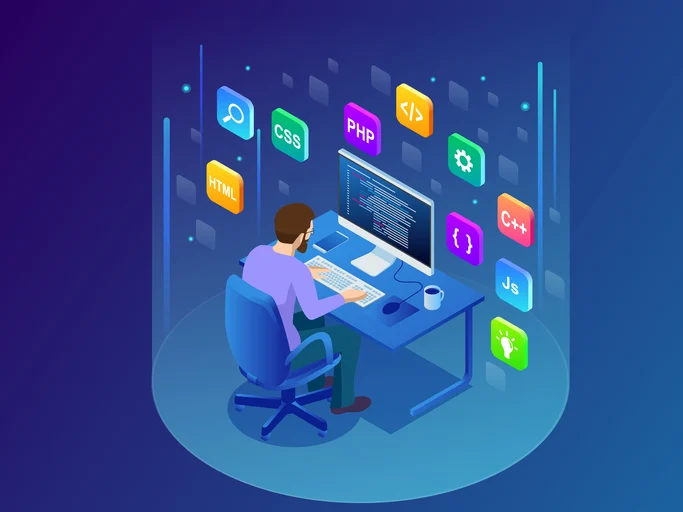In the ever-evolving world of information technology, certifications are more than just badges of knowledge—they’re gateways to career advancement, credibility, and specialized expertise. For both aspiring professionals and seasoned IT experts, certifications validate technical skills, showcase a commitment to continuous learning, and often lead to better opportunities and higher salaries.
This comprehensive guide will demystify IT certifications, help you choose the right ones for your career goals, and outline the steps to achieve them. Whether you’re new to IT or looking to enhance your skill set, this article will serve as your ultimate roadmap.
Why IT Certifications Matter in Today’s Job Market
In the competitive tech industry, certifications are increasingly seen as non-negotiable for many roles. Employers often prioritize candidates with certifications because these credentials demonstrate hands-on expertise and a strong grasp of core concepts. Here are some reasons why IT certifications matter:
- Career Advancement: Certifications can open doors to leadership roles or highly specialized positions.
- Increased Earnings Potential: Certified professionals often earn significantly more than their non-certified peers.
- Credibility: They establish your reliability and expertise, making you a trusted professional in the field.
- Access to Cutting-Edge Knowledge: IT certifications require staying updated with the latest trends, tools, and practices.
- Global Recognition: Many certifications are recognized worldwide, boosting your marketability across borders.
According to the Global Knowledge IT Skills and Salary Report, IT professionals with certifications earn, on average, 22% more annually than those without them.
Types of IT Certifications: Choosing the Right Path
The world of IT certifications is vast and varied. Here’s an overview of the main categories:
- Entry-Level Certifications: Ideal for beginners, these certifications cover fundamental concepts and provide a strong foundation for more advanced credentials. Examples include CompTIA A+ and Cisco’s CCNA.
- Networking Certifications: These focus on the design, implementation, and maintenance of network systems. Examples include Cisco CCNP, Juniper Networks certifications, and CompTIA Network+.
- Cloud Computing Certifications: In the era of cloud dominance, certifications like AWS Certified Solutions Architect, Microsoft Azure Fundamentals, and Google Cloud Professional are highly sought after.
- Cybersecurity Certifications: As cyber threats increase, so does the demand for experts. Certifications such as Certified Information Systems Security Professional (CISSP) and Certified Ethical Hacker (CEH) are industry gold standards.
- Data and Analytics Certifications: Certifications like Microsoft Certified: Data Analyst Associate and Google Data Analytics Certificate focus on extracting and analyzing valuable data insights.
- Development and DevOps Certifications: For those in software development and continuous deployment, certifications like AWS Certified DevOps Engineer and Certified Kubernetes Administrator (CKA) are valuable.
- Project Management Certifications: Certifications like PMP (Project Management Professional) and Certified ScrumMaster (CSM) help IT professionals lead and execute projects effectively.
- Vendor-Specific Certifications: Tech giants like Microsoft, Oracle, and SAP offer specialized certifications for their platforms and software.
By aligning certifications with your career goals, you can strategically build your expertise in areas most relevant to your interests and ambitions.

Top IT Certifications to Consider in 2024
Here’s a breakdown of the most sought-after IT certifications for this year:
- CompTIA Security+: A foundational cybersecurity certification covering essential principles for securing networks.
- AWS Certified Solutions Architect – Associate: One of the most respected cloud certifications globally.
- Cisco Certified Network Associate (CCNA): Essential for those pursuing careers in networking.
- Certified Information Security Manager (CISM): Focused on security management practices.
- Certified Data Professional (CDP): Ideal for professionals specializing in data management and analysis.
How to Choose the Right IT Certification for Your Career Goals
Choosing the right IT certification requires aligning your interests, current skills, and career aspirations. Here’s a step-by-step guide to help you navigate this decision:
- Assess Your Current Skill Level:
Are you a beginner, intermediate, or advanced IT professional? Entry-level certifications like CompTIA IT Fundamentals or A+ are great starting points, while advanced professionals might aim for certifications like CISSP or AWS Certified Solutions Architect. - Identify Your Career Objectives:
- Want to specialize in networking? Consider Cisco CCNA or CCNP.
- Interested in cybersecurity? Focus on certifications like CISSP, CEH, or CompTIA Security+.
- Passionate about cloud computing? AWS, Azure, and Google Cloud certifications are essential.
- Research Industry Demand:
Look for certifications frequently listed in job postings for roles you aspire to. For example, cloud certifications are highly in demand due to the widespread adoption of cloud platforms. - Understand Prerequisites:
Some certifications require prior experience or foundational knowledge. For example, CISSP requires at least five years of experience in information security. - Consider Your Budget and Time:
Certification exams can range from $100 to $700 or more. Factor in the cost of training materials, study time, and retake fees if applicable. - Seek Guidance:
Join IT communities, attend webinars, or consult mentors in your desired field. Networking can provide valuable insights into certifications that employers value most.
By carefully considering these factors, you can make an informed choice that accelerates your career growth.
Preparing for IT Certifications: Strategies for Success
Achieving an IT certification requires dedication, strategic planning, and access to the right resources. Here’s how you can prepare effectively:
- Gather Study Materials:
Use a mix of official study guides, video tutorials, online courses, and practice exams. Platforms like Udemy, Coursera, and LinkedIn Learning offer excellent resources. - Set a Study Schedule:
Dedicate a consistent amount of time daily or weekly to studying. Create a realistic timeline based on your work and personal commitments. - Join Study Groups or Forums:
Communities like Reddit’s ITCertifications or CompTIA forums can provide peer support, advice, and shared resources. - Take Practice Tests:
Simulate exam conditions with practice tests. Identify weak areas and focus on improving them. - Hands-On Experience:
Practical experience is crucial for certifications like AWS, Cisco, or CompTIA. Set up a home lab or use virtual environments to apply what you learn. - Stay Motivated:
Break your study goals into smaller milestones and reward yourself for achievements.
Preparation is as much about discipline as it is about resources. By following a structured approach, you can increase your chances of passing certification exams on the first attempt.
The Certification Exam: Tips to Excel
The day of the exam is your moment to shine. Here’s how to maximize your performance:
- Understand the Exam Format:
Familiarize yourself with the number of questions, time limit, and question types (multiple choice, simulations, etc.). - Arrive Early and Prepared:
For in-person exams, arrive 30 minutes early. For online exams, ensure your equipment meets the technical requirements. - Read Questions Carefully:
Avoid rushing. Take your time to understand what’s being asked, especially for scenario-based questions. - Manage Your Time:
Allocate time for each question and don’t get stuck on difficult ones. Flag them for review if the platform allows it. - Stay Calm:
Anxiety can impact performance. Practice deep breathing and focus on one question at a time.
Maintaining and Renewing IT Certifications
Many IT certifications require periodic renewal to remain valid. Here’s what you need to know:
- Renewal Cycles:
Certifications like CompTIA Security+ or AWS are valid for 2-3 years. Renewal involves earning Continuing Education Units (CEUs) or retaking the exam. - Continuing Education:
Attend webinars, complete online courses, or gain new certifications to earn CEUs. - Stay Updated:
IT evolves rapidly, so staying current ensures your certifications remain relevant in the job market.
The Financial Benefits of IT Certifications
Earning an IT certification is an investment in your professional growth, and the financial rewards often outweigh the initial costs. Here’s how certifications can boost your earning potential:
- Higher Starting Salaries:
Certified IT professionals often command higher starting salaries. For instance, a certified AWS Solutions Architect can earn upwards of $120,000 annually in some markets. - Promotions and Raises:
Certifications demonstrate your commitment to growth and expertise, making you a strong candidate for promotions and salary increases. - Specialized Roles with Premium Pay:
Advanced certifications like CISSP or Microsoft Azure Expert lead to niche roles with lucrative compensation packages. - Freelancing Opportunities:
Certifications allow you to stand out as a freelancer, enabling you to charge premium rates for specialized services. - Employer Sponsorships:
Many organizations recognize the value of certifications and may sponsor exam fees or provide incentives for obtaining them.
According to Global Knowledge’s IT Salary Report, certifications like PMP and CISSP are among the highest-paying credentials in the industry.
How to Fund Your IT Certification Journey
IT certifications can be expensive, but there are ways to minimize costs and maximize value:
- Employer Support:
Check if your employer offers reimbursement or training budgets for certifications. - Scholarships and Grants:
Some organizations, like CompTIA and (ISC)², offer scholarships for aspiring professionals. - Discount Programs:
Look for discounts provided by training platforms or certification bodies, especially during special events like Cyber Monday or student programs. - Free or Low-Cost Resources:
Leverage free resources like YouTube tutorials, community forums, and open-source tools for self-study. - Bundle Deals:
Many platforms offer discounted bundles that include study materials and exam vouchers.
By strategically managing costs, you can achieve certifications without straining your finances.
Overcoming Common Challenges in IT Certification
The journey to certification isn’t always smooth. Here are strategies to overcome common hurdles:
- Time Constraints:
- Challenge: Balancing work, life, and study time.
- Solution: Break your study sessions into smaller chunks and stick to a strict schedule.
- Difficulty Understanding Material:
- Challenge: Complex topics can be overwhelming.
- Solution: Use a variety of learning materials, including videos, hands-on labs, and peer discussions.
- Exam Anxiety:
- Challenge: Fear of failure can impact performance.
- Solution: Take mock exams to build confidence and become familiar with the format.
- Financial Barriers:
- Challenge: High costs of exams and materials.
- Solution: Seek employer funding, use free resources, and look for discounts.
Every challenge is an opportunity to grow. With the right mindset and resources, you can overcome these obstacles and succeed.

IT Certifications: A Gateway to Networking Opportunities
Certifications don’t just enhance your skills—they also expand your professional network:
- Join Certification Communities:
Many certification bodies have dedicated forums or LinkedIn groups where members share insights, job opportunities, and advice. - Attend Industry Events:
Certification holders often gain access to exclusive events, webinars, and conferences where you can meet industry leaders. - Mentorship Opportunities:
Certified professionals often become mentors for others, strengthening both their network and leadership skills.
Networking is a vital component of career growth, and certifications provide a platform to connect with like-minded professionals.
Maximizing the Long-Term Value of IT Certifications
Earning an IT certification is only the beginning of your journey. To fully leverage its potential, you need to take proactive steps to integrate it into your career development.
- Showcase Your Certification:
- Update your resume and LinkedIn profile to prominently display your certifications.
- Include your certifications in your email signature and personal branding materials.
- Apply Your Skills in Real Projects:
- Seek opportunities to use your new knowledge in your current role.
- Volunteer for challenging tasks that align with your certification expertise.
- Stay Informed About Industry Trends:
- Follow industry blogs, attend webinars, and subscribe to newsletters from certification bodies to stay updated.
- Pursue Continuous Learning:
- Use your certification as a stepping stone for advanced credentials or complementary certifications.
- Explore related fields, such as combining cloud computing and cybersecurity skills.
- Network and Collaborate:
- Attend events and join forums to connect with other professionals in your field.
- Collaborate on projects that highlight your skills and expertise.
By actively utilizing and expanding upon your certification, you ensure it becomes a key asset in your professional growth.
The Future of IT Certifications: Trends to Watch
The landscape of IT certifications is constantly evolving, driven by technological advancements and market demands. Here are some trends to watch:
- Specialization:
Certifications are becoming more focused on niche areas, such as AI ethics, quantum computing, and blockchain. - Micro-Credentials:
Shorter, targeted certifications that validate specific skills are gaining popularity. - Integration of Soft Skills:
Certifications increasingly emphasize teamwork, communication, and leadership in addition to technical expertise. - Continuous Assessment:
Instead of one-time exams, some certifications now require ongoing assessments to maintain relevance. - AI and Automation:
Certifications in AI, machine learning, and automation tools will continue to grow in demand.
Staying aware of these trends can help you future-proof your career and align your skills with industry needs.
Your Path to IT Certification Success
Embarking on the journey to earn IT certifications is a significant step toward building a successful career in technology. From choosing the right certification to mastering the exam and applying your skills in the real world, every step of the process adds value to your professional profile.

Remember that certifications are not just about passing an exam; they’re about gaining knowledge, demonstrating expertise, and opening doors to new opportunities. With dedication, the right resources, and a clear strategy, you can achieve your certification goals and elevate your career to new heights.
Take that first step today—whether it’s researching a certification, joining a study group, or scheduling an exam. Your future in IT awaits, and the possibilities are endless.
This article is your roadmap to navigating the dynamic world of IT certifications. By following the insights and strategies outlined here, you’re setting yourself up for a rewarding and successful career in technology.



